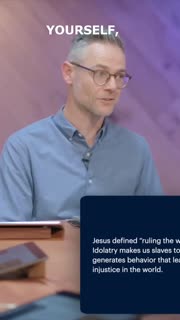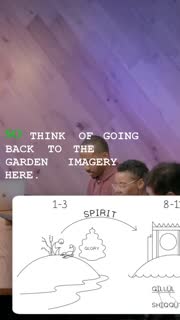Idolatry and Divine Presence: Lessons from Ezekiel
Devotional
Sermon Summary
Bible Study Guide
Sermon Clips
### Quotes for Outreach
1. "So all of a sudden, Eden is the... Wherever Yahweh's presence is, connecting heaven and earth together, that's where Eden is. And people can think that they're in Eden because, you know, they made this elaborate building and the rituals surrounding it. But Eden can become anti-Eden, if you get the idea. Yeah, it's all, it's just an inversion and a reversal." [09:08] (26 seconds)
2. "So I think where the biblical authors would want us to imagine is how is it that we sell out our allegiance to cultural creations of our own making? Whether they're economic, institutional, the ashram. The ashram represents fertility, abundance, security, and military might. Are these things to which people tend to give their allegiance?" [24:46] (33 seconds)
3. "So you just got to ask yourself, like, whatever it is that I give my allegiance to, does it lead to more love and more life, or does it lead to conflict, division, and violence? And, you know, you know a tree by its fruit, I guess." [31:11] (16 seconds)
4. "And somehow what idolatry does is it's becoming slaves to things that there are creations and they generate behaviors individually and corporately that create violence in the world. And that's one of the ways you know it's not the one true God, is because allegiance to those things leads to violence, as Ezekiel sees in his day." [30:43] (27 seconds)
5. "This is a set of glasses that we're called to pick up. And so we can identify the idols that provoke jealousy that exist in our families, in our neighborhoods, in our cities, and in our cultures. And when you begin to spot those things, it's a really sobering reality." [34:05] (26 seconds)
### Quotes for Members
1. "So think of going back to the garden imagery here. So here's Ezekiel in the spirit, and he's seeing in to the precincts of the temple. And what he sees in there is creepers and crawlers. Come now. Come on. He's seeing all these creepy animals inscribed onto the walls." [14:14] (29 seconds)
2. "So what we're talking about here, what is supposed to be inscribed on the walls and the curtains? There's the cherubim. So it's interesting. So those are animal-like things. But the difference is that they are the guardians. They are not Elohim. They're the guardians of the divine presence. And here, by offering incense to them, it's as if you're turning created things into the role of the creator by offering prayer. And incense before them." [20:45] (33 seconds)
3. "So this is an interesting connection, I think, for us moderns. We tend to think of idolatry, giving one's allegiance to a statue or to the sun, as like, well, aren't we glad that we've graduated? You know, beyond that kind of primitive thing. And then, you know, violence or injustice, like that's kind of its own category. But for the biblical authors, these things are all connected." [23:14] (30 seconds)
4. "So the cosmology of Genesis 1 is that creation, humans are intimately bound up with creation because they emerged from it. But at the same time, they're called, we are called to not be mastered by it, but to transcend our creaturely origins to participate in something that's almost unimaginable to us that isn't bound by the fate of creation." [28:58] (32 seconds)
5. "Thinking back to our earlier sessions, you know, like, when I genuinely have a moment where I give... where I give up what I want so that I can serve and benefit the needs of another, in those moments, those are really powerful moments. As a parent, I'm forced to undergo and experience those moments on a regular basis. And it does something to me where you're like, man, I think real living is not what I think it is. I think it's actually giving up what I want so that I can love another creature and serve it." [30:05] (39 seconds)
Ask a question about this sermon
1. "So all of a sudden, Eden is the... Wherever Yahweh's presence is, connecting heaven and earth together, that's where Eden is. And people can think that they're in Eden because, you know, they made this elaborate building and the rituals surrounding it. But Eden can become anti-Eden, if you get the idea. Yeah, it's all, it's just an inversion and a reversal." [09:08] (26 seconds)
2. "So I think where the biblical authors would want us to imagine is how is it that we sell out our allegiance to cultural creations of our own making? Whether they're economic, institutional, the ashram. The ashram represents fertility, abundance, security, and military might. Are these things to which people tend to give their allegiance?" [24:46] (33 seconds)
3. "So you just got to ask yourself, like, whatever it is that I give my allegiance to, does it lead to more love and more life, or does it lead to conflict, division, and violence? And, you know, you know a tree by its fruit, I guess." [31:11] (16 seconds)
4. "And somehow what idolatry does is it's becoming slaves to things that there are creations and they generate behaviors individually and corporately that create violence in the world. And that's one of the ways you know it's not the one true God, is because allegiance to those things leads to violence, as Ezekiel sees in his day." [30:43] (27 seconds)
5. "This is a set of glasses that we're called to pick up. And so we can identify the idols that provoke jealousy that exist in our families, in our neighborhoods, in our cities, and in our cultures. And when you begin to spot those things, it's a really sobering reality." [34:05] (26 seconds)
### Quotes for Members
1. "So think of going back to the garden imagery here. So here's Ezekiel in the spirit, and he's seeing in to the precincts of the temple. And what he sees in there is creepers and crawlers. Come now. Come on. He's seeing all these creepy animals inscribed onto the walls." [14:14] (29 seconds)
2. "So what we're talking about here, what is supposed to be inscribed on the walls and the curtains? There's the cherubim. So it's interesting. So those are animal-like things. But the difference is that they are the guardians. They are not Elohim. They're the guardians of the divine presence. And here, by offering incense to them, it's as if you're turning created things into the role of the creator by offering prayer. And incense before them." [20:45] (33 seconds)
3. "So this is an interesting connection, I think, for us moderns. We tend to think of idolatry, giving one's allegiance to a statue or to the sun, as like, well, aren't we glad that we've graduated? You know, beyond that kind of primitive thing. And then, you know, violence or injustice, like that's kind of its own category. But for the biblical authors, these things are all connected." [23:14] (30 seconds)
4. "So the cosmology of Genesis 1 is that creation, humans are intimately bound up with creation because they emerged from it. But at the same time, they're called, we are called to not be mastered by it, but to transcend our creaturely origins to participate in something that's almost unimaginable to us that isn't bound by the fate of creation." [28:58] (32 seconds)
5. "Thinking back to our earlier sessions, you know, like, when I genuinely have a moment where I give... where I give up what I want so that I can serve and benefit the needs of another, in those moments, those are really powerful moments. As a parent, I'm forced to undergo and experience those moments on a regular basis. And it does something to me where you're like, man, I think real living is not what I think it is. I think it's actually giving up what I want so that I can love another creature and serve it." [30:05] (39 seconds)










